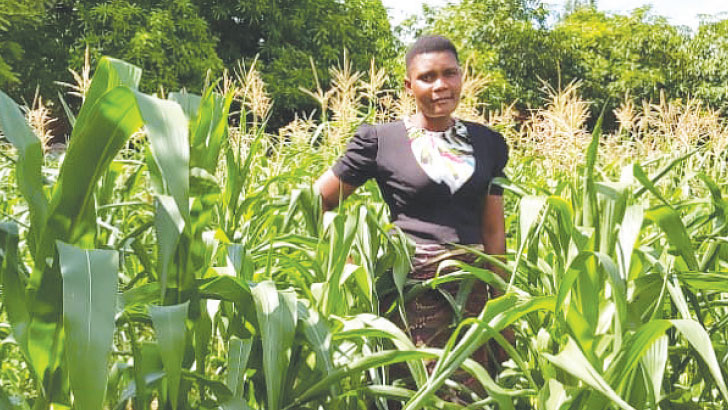What makes Mpata smile?
Three years ago, Janet Mpata, 26, from Mwamadi Village in Mulanje was neither a food producer nor in charge of her own nutrition.
Her homestead was chronically a house of hunger until she heard about Afikepo and Kulima programmes funded by the European Union (EU).
“I was living with my parents after dropping out of school due to pregnancy. I relied on them for everything and they would go farming while I stayed home. I never used to work in the fields,” she says.
Mpata was accustomed to idling until she started engaging with her neighbours involved in the EU-funded projects where she learnt about nutrition and agricultural production.

This introduced her to high-yielding farming methods and healthy diets comprising all six groups.
In no time, the lady changed her dietary habits and gave birth to a healthy baby.
“I realised that I needed to have my own crop field to take control of my diet and what the baby eats. Luckily, my parents gave me half an acre,” she says.
Mpata learnt novel farming methods to yield more on her plot equivalent to half a soccer field despite erratic rainfall due to climate change.
She was one of three people invited to join a community-based facilitators supported by Kulima.
It is here that she gained various farming skills and technology.
Mpata grows a diverse mix of crops: maize, sweet potatoes, cassava, pigeon peas and groundnuts.
She also established a backyard garden where she grows vegetables using the knowledge from farmer field school sessions supported by the United Nations (UN) Food and Agriculture Organisation (FAO) in partnership with the government.
The farmer field schools have enhanced capacities of extension service providers to facilitate transformative learning for productive farmers to achieve sustainable production despite emerging challenges, including climate change. The approach develops the skills smallholder farmers in rural communities require to increase their food, nutrition and income security.
Following the advice from farmer field school master trainer Charles Hausi, Mpata also uses flower pots on her verandah to grow vegetables and pumpkins which are somehow decorative.
The woman says farmer field school sessions have increased her knowledge and she now works harder to produce right kinds of foods and quantities.
“Being a care promoter has opened my mind to use diverse foods for better nutrition. I am now food secure and my child gets all food groups,” says Mpata, a single mother.
Last growing season, she harvested seven bags of maize and currently remains with five.
“Through Afikepo, I have learnt to combine various types of foods for our meals. I no longer rely on nsima alone. I usually switch from the meal made of maize flour to other foodstuffs such as bananas which are a good source of energy,” she says.
Since 2019, Mpata has been facilitating her own community-based outreach group called Thawa Juni, a Chichewa phrase meaning “an escape from the cold”.
The facilitator supports her farmer group with learning from their experience.
She is also a member of Tilimbike 1 Farmer Field School where she participates in studies to improve her productivity.
FAO and UN Children’s Fund (Unicef) are supporting the implementation of the Afikepo to improve nutrition as slightly over a third of Malawian children are stunted, a sign of severe acute malnutrition.
FAO project coordinator Patrick Kombe commends the government’s departments of Nutrition, HIV and Aids and Agriculture Extension Services for the success stories.
“Afikepo means ‘let them [children] develop to their full potential’, so we seeks to address chronic malnutrition in Malawi through activities that are supporting the diversification and intake of safe and nutritious foods to achieve optimal nutrition for women of child-bearing ages, adolescent girls, infants and young children,” he says.
FAO is also supporting the Department of Agricultural Extension Services in revitalising agricultural clusters and Ulimi wa M’ndandanda through Farmer Field Schools within the framework of EU Kulima programme.
Kulima seeks to achieve a sustainable increase in agricultural productivity and diversified production amid climate change.
“Kulima programme supports government extension service providers and community-based facilitators who are targeted for training on the farmer field school methodology,” says Kombe.
Afikepo and Kulima programmes started in 2017 and winds up in 2022.
They are being implemented in Chitipa, Karonga, Mzimba, Nkhata Bay, Kasungu, Nkhotakota, Salima, Chiradzulu, Thyolo and Mulanje districts to achieve Sustainable Development Goal 2—ending hunger by 2030.
About 400 000 households are expected to benefit.





